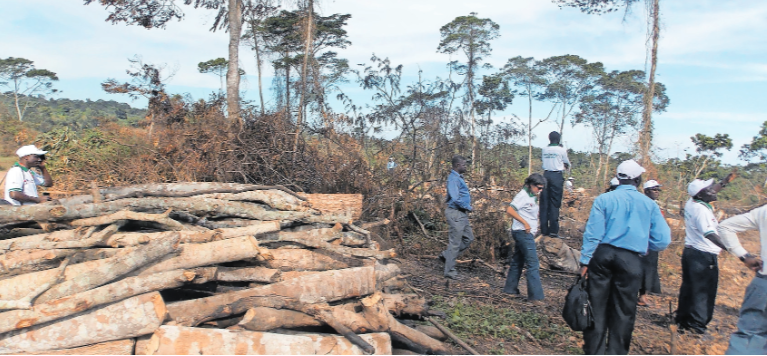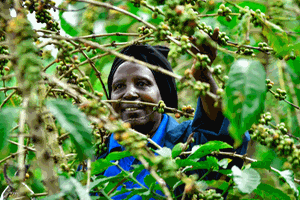
Cutting down forests to grow coffee is banned. PHOTO | MICHAEL J. SSALI
It is impossible to practice gainful farming without careful management of plants, animals, and the environment.
Farmers are urged to take good care of animals or livestock if they are to get better products such as meat, eggs, milk, skins, hides, or even manure. They must also pay a lot of attention to the plants to get food, firewood, cotton, medicine, and mulching material.
Good management of both livestock and plants results in fertile soil as well as increased farmers’ incomes. Good care of the soil is considered part of environmental management because nearly all plants get their nourishment from the soil. Such practices are considered regenerative agriculture.
Regenerative agriculture is considered an evolution of conventional farming, careful use of water and other inputs, preventing land degradation, and avoiding deforestation. It protects and improves soil, biodiversity, climate resilience, and water resources while making farming more productive and profitable.
It is a process of restoring degraded soil by using such practices as adaptive grazing, no-till planting, no use or limited use of pesticides and synthetic fertiliser, based on ecological principles. Regenerative agriculture strives to work with nature rather than destroying it.
Coffee farmers are required to do exactly that. We are practising agriculture and growing coffee, a delicate crop, in times of climate change. If the world becomes warmer just by a few degrees, we will not be able to grow coffee, which for us is a major cash crop.
Global warming is the alternative term used for climate change and is the greatest environmental threat of our times. Scientists are already warning of possible rising sea levels due to the melting of glaciers in the northern hemisphere and submersion of some island countries in the oceans, violent floods, droughts, cyclones, and changing general agricultural conditions.
Mitigating climate change
In December 2022, the European Parliament resolved to stop buying coffee that is grown in spaces where farmers have destroyed forests to plant coffee.
The resolution, referred to as the European Union Deforestation Resolution (EUDR), bans the importation into the bloc’s countries of products, including coffee, obtained after the cutting down of trees and destruction of forests.
Europe will only buy deforestation-free products and it will ensure that all supply chains remain free from products that cause deforestation. The EUDR takes effect on December 31 this year. There is ongoing widespread sensitization across the country to ensure that all coffee farmers adhere to the EU’s demands.
However, forcing countries such as Uganda to stop cutting down forests for coffee growing is bound to lead to challenges because the crop is at the heart of wealth, poverty alleviation, and development in the third world.
It is said to be the most traded commodity in the world after oil. Many are asking why the EU is choosing coffee and whether the block will also stop the importation of oil, a fossil fuel, since its usage contributes to global warming.
“It is not always necessary to expand the garden space by cutting trees and forests to increase coffee yields; what really matters is to improve the way you conserve the soil where the farmer grows the crops and the way he manages the planting process. There is no need to cut down forests or to grow crops in wetlands just because you want to increase yields,” says Dr Eseri Nankya, a soil scientist at the National Agricultural Research Organisation (Naro).
She advises farmers to ensure the soil is well protected and well nourished.
Dr Nankya also calls for the use of organic manure and to have the soil of their gardens tested to find out what soil nutrients are missing and with guidance from agricultural extension officers, apply the right fertilisers.
“Farmers should also plant trees at the right spacing in their gardens to provide shade to the crops. The trees send out their roots to deeper layers of the soil and take in soil nutrients that sunk too far for ordinary crops to use,” she explains.
“The trees then absorb the nutrients and return them to the upper soil layers when they drop their leaves, which rot on the ground and become manure for the crops to use," she adds.
The soil scientist says planting trees is another way of soil nutrient regeneration apart from providing shade to the crops and protecting them from strong wind and soil erosion. She further says to prevent too much competition for light, the farmers should periodically prune the trees.
Planting trees and preserving natural forests is helpful because trees breathe in carbon dioxide and breathe out oxygen. Forests are referred to by environmentalists as carbon sinks.
Coffee production
Growing global awareness of environmental sustainability in coffee production is driven by concerns about deforestation, climate change, and biodiversity loss.
Consumers, producers, and governments are increasingly demanding eco-friendly practices, promoting shade-grown coffee, reforestation, and reduced chemical use to protect ecosystems and ensure a more sustainable future for the coffee industry.
Coffee is sourced from more than 50 nations for import into the EU, playing an essential role in the economic and social growth of its producing nations.
There are about 12.5 million coffee farms, most of which are under five hectares and owned by smallholder farmers, supporting around 25 million families dependent on coffee for their livelihoods.
Coffee deforestation Coffee deforestation refers to the large-scale clearing of forests to make way for coffee plantations, particularly in tropical regions. As global demand for coffee continues to rise, so does the need for more land to grow coffee beans. Unfortunately, this often leads to the destruction of forests, which are cleared to expand coffee production.
This is a big problem in key coffee-producing regions like Latin America, Africa, and Southeast Asia, where forests are disappearing at an alarming rate. Source: TraceX.
TraceX is a blockchain-powered food traceability platform.




